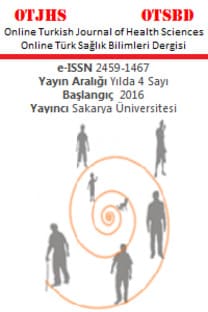COVID-19 Pandemisi Sırasında Kullanılan Omalizumab Tedavisi COVID-19 Sıklığı ve Şiddeti Üzerine Etkili midir?
Antihistamin, COVID-19, insidans, omalizumab, ürtiker
Is Omalizumab Treatment Used During the COVID-19 Pandemic Effective on the Frequency and Severity of COVID-19?
Antihistamine, COVID-19, incidence, omalizumab, urticaria,
___
- Coronavirus Resource Center of the John Hopkins University [Internet]. The COVID-19 testing insights initiative; 2021. https://coronavirus.jhu.edu/. Accessed June 23, 2021.
- Huang C, Wang Y, Li X, et al. Clinical features of patients infected with 2019 novel coronavirus in Wuhan, China. Lancet. 2020;395(10223):497-506. doi:10.1016/S0140-6736(20)30183-5
- Zuberbier T, Aberer W, Asero R, et al. The EAACI/GA(2) LEN/EDF/WAO Guideline for the definition, classification, diagnosis, and management of urticaria: the 2013 revision and update. Allergy. 2014;69(7):868-887. doi:10.1111/all.12313
- Grieco T, Dies L, Sernicola A, et al. Potential clinical and serological predictors of chronic spontaneous urticaria relapse in patients under omalizumab treatment. Immunotherapy. 2020;12(16):1173-1181. doi:10.2217/imt-2020-0088
- Saini SS, Bindslev-Jensen C, Maurer M, et al. Efficacy and safety of omalizumab in patients with chronic idiopathic/spontaneous urticaria who remain symptomatic on H1 antihistamines: a randomized, placebo-controlled study. J Invest Dermatol. 2015;135(1):67-75. doi:10.1038/jid.2014.306
- Acer E, Kaya Erdogan H, Yüksel Çanakçı N, Saracoglu ZN. The effect of omalizumab on hematological and inflammatory parameters in patients with chronic spontaneous urticaria. Cutan Ocul Toxicol. 2019;38(1):5-8. doi:10.1080/15569527.2018.1495227
- Lommatzsch M, Stoll P, Virchow JC. COVID-19 in a patient with severe asthma treated with Omalizumab. Allergy. 2020;75(10):2705-2708. doi:10.1111/all.14456
- Vultaggio A, Agache I, Akdis CA, et al. Considerations on biologicals for patients with allergic disease in times of the COVID-19 pandemic: An EAACI statement. Allergy. 2020;75(11):2764-2774. doi:10.1111/all.14407
- Salman A, Alper S, Atakan N, et al. Recommendations on the use of systemic treatments for urticaria and atopic dermatitis during the COVID-19 pandemic: Statement of Dermatoallergy Working Group of the Turkish Society of Dermatology. Turkderm-Turk Arch Dermatol Venereology. 2020;54:71-75. doi:10.4274/turkderm.galenos.2020.80000
- Hogan Ii RB, Hogan Iii RB, Cannon T, et al. Dual-histamine receptor blockade with cetirizine-famotidine reduces pulmonary symptoms in COVID-19 patients. Pulm Pharmacol Ther. 2020;63:101942. doi:10.1016/j.pupt.2020.101942
- Wang T, Hou W, Fu Z. Preventative effect of OMZ-SPT on lipopolysaccharide-induced acute lung injury and inflammation via nuclear factor-kappa B signaling in mice. Biochem Biophys Res Commun. 2017;485(2):284-289. doi:10.1016/j.bbrc.2017.02.090
- Living guidance for clinical management of COVID-19; 2021. https://www.who.int/publications/i/item/WHO 2019-nCoV-clinical-2021-2. Accessed Nov 23, 2021.
- Criado PR, Criado RFJ, Pincelli TP, Yoshimoto TA, Naufal GGA, Abdalla BMZ. Chronic spontaneous urticaria exacerbation in a patient with COVID-19: rapid and excellent response to omalizumab. Int J Dermatol. 2020;59(10):1294-1295. doi:10.1111/ijd.15134
- Alizadeh Aghdam M, Knol EF, van den Elzen M, et al. Response of FcεRI-bearing leucocytes to omalizumab in chronic spontaneous urticaria. Clin Exp Allergy. 2020;50(3):364-371. doi:10.1111/cea.13566
- Kritas SK, Ronconi G, Caraffa A, Gallenga CE, Ross R, Conti P. Mast cells contribute to coronavirus-induced inflammation: new anti-inflammatory strategy. J Biol Regul Homeost Agents. 2020;34(1):9-14. doi:10.23812/20-Editorial-Kritas
- Kocatürk E, Salman A, Cherrez-Ojeda I, et al. The global impact of the COVID-19 pandemic on the management and course of chronic urticaria. Allergy. 2021;76(3):816-830. doi:10.1111/all.14687
- Branco ACCC, Yoshikawa FSY, Pietrobon AJ, Sato MN. Role of Histamine in Modulating the Immune Response and Inflammation. Mediators Inflamm. 2018;9524075. doi:10.1155/2018/9524075
- Gill MA, Liu AH, Calatroni A, et al. Enhanced plasmacytoid dendritic cell antiviral responses after omalizumab. J Allergy Clin Immunol. 2018;141(5):1735-1743.e9. doi:10.1016/j.jaci.2017.07.035
- Lee JS, Shin EC. The type I interferon response in COVID-19: implications for treatment. Nat Rev Immunol. 2020;20(10):585-586. doi:10.1038/s41577-020-00429-3
- Bostan E, Zaid F, Karaduman A, et al. The effect of COVID-19 on patients with chronic spontaneous urticaria treated with omalizumab and antihistamines: A cross-sectional, comparative study. J Cosmet Dermatol. 2021;20(11):3369-3375. doi:10.1111/jocd.14484
- ISSN: 2459-1467
- Yayın Aralığı: Yılda 4 Sayı
- Başlangıç: 2016
- Yayıncı: Oğuz KARABAY
Zehra BAŞAR KOCAGÖZ, Enes SARIGEDİK, Burcu SARIGEDİK
Hemşirelerin Sosyodemografik Özelliklerine Göre Uyku Hijyeninin Değerlendirilmesi
Çiğdem Müge HAYLI, Gülendam HAKVERDİOĞLU YÖNT, Dilek DEMİR KÖSEM
COVID-19 Pandemisinde Gebelikten Doğum Sonrasına Ruh Sağlığı: Boylamsal Bir Çalışma
Sidika Özlem CENGİZHAN, Esra GÜNEY, Esra SABANCI BARANSEL, Esra KARATAŞ OKYAY, Tuba UÇAR
Ebeveynin Okupasyonel Dengesi ve Çocuk-Ebeveyn İlişkisi
Esma ÖZKAN, Serkan PEKÇETİN, Rüya Gül TEMEL
Atrial Fibrilasyonu olan Hastalarda Tiroid Fonksiyon Bozukluğunun Değerlendirilmesi
Rabia ÖZTAŞ KARA, Bahar SEVİMLİ DİKİCİER, Ahmet Can YAĞMUR, Ahmet KARA, Mahizer YALDIZ
Depresyon Tanısı Alan Hastalarda Hoşgörü, Affetme ve Depresyon Düzeyleri Arasındaki İlişki
İnterferon-gamma ile İndüklenebilir Protein-10: COVID-19 Hastalığı için Bir Ölüm Göstergesi Değildir
Mahmud İSLAM, Hamad DHEİR, Elif ÖZÖZEN ŞAHİN, Selcuk YAYLACI, Abdülkadir AYDIN, Musa PINAR, Ertuğrul GÜÇLÜ, Ahmed Cihad GENÇ, Mehmet KÖROĞLU, Oğuz KARABAY
Oral Antikoagülan Kullanan Covid-19 Hastalarının Hastane İçi Klinik Sonuçları
